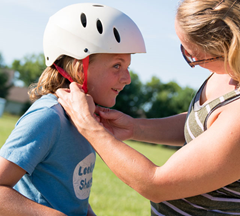What To Know About Spinal Cord Injuries

Answer a few questions and we'll provide you with a list of primary care providers that best fit your needs.
When it comes to spinal cord injuries (SCI), men lead women. By a lot.
According to the American Association of Neurological Surgeons, males have a claim on 81.2 percent of all reported SCIs. Men represent an even larger share of sports-related SCIs: 89.8 percent.
Spinal cord injuries – which are a common cause of permanent disability and death in children and adults – most often result from a traumatic blow that fractures or dislocates vertebrae. These are the bones that make up your spine.
Displaced bone fragments, disc material, or ligaments may bruise, partially tear, or completely tear nerves in the spinal cord, which runs through the center of the vertebrae, carrying signals from the brain to the rest of your body.
These injuries can disrupt and even block nerve signals that control motor, sensory, and vital involuntary functions like breathing.
Spinal cord injuries are often described as being complete or incomplete. A complete spinal cord injury results in a total loss of sensory and motor function below the level of injury in the spinal column. That is, you are paralyzed below the injury. With an incomplete injury, the affected nerves retain some ability to send messages. This allows you to have some movement and sensation below the injury.
Nearly complete recovery is possible with some spinal cord injuries. Others result in complete paralysis. The higher up the injury in the spinal column, typically the more serious the injury.
How Are Spinal Cord Injuries Treated?
A spinal cord injury requires immediate medical attention by paramedics and other emergency personnel at the accident or injury scene. Immediate treatment, which includes immobilizing your head and neck to prevent movement, can reduce long-term effects.
In the emergency department, immobilization continues as life-threatening problems are identified and addressed.
Surgery may be needed to assess injury to the spinal cord, stabilize fractured vertebrae to release pressure on nerves, and repair other injuries. Screws, metal plates, and other devices may be implanted during surgery to stabilize the spine. Or traction or a brace may be used instead.
In the hospital, your treatment also may include:

- Observation and management in the intensive care unit (ICU)
- Medicines, such as corticosteroids, to help decrease swelling in the spinal cord
- Breathing machine, or ventilator, to help you breathe
- Traction to help bring the spine into proper alignment
- Feeding tube to provide extra nutrition and calories
SCI recovery often requires a long-term stay in a hospital and rehabilitation.
Rehabilitation programs combine physical, occupational, and speech therapies to help you regain strength, movement and function after a spinal cord injury – as well as learn new ways of getting around and accomplishing tasks. Rehabilitation also includes counseling to provide social and emotional support for you and your loved ones.
Nearly complete recovery is possible with some spinal cord injuries. Others result in complete paralysis.
What Are the Primary Causes Of Spinal Cord Injuries?
Spinal cord injuries can occur in many ways, in many activities. Some of the most common causes include:
- Falls
- Motor vehicle accidents
- Athletic injuries
- Diving accidents, particularly in shallow water
- Trampoline accidents
- Violence, such as gunshot or stab wounds
- Infections that form an abscess on the spinal cord
- Birth injuries, which typically affect the spinal cord in the neck area
Can You Prevent Spinal Cord Injury?
While there’s no guaranteed way to prevent a spinal cord injury, you can reduce your chances through good safety practices such as:
- Never driving while under the influence of alcohol or drugs
- Avoiding distractions while driving, such as texting
- Always wearing a seatbelt while in a motor vehicle
- Wearing a helmet when you ride a motorcycle or take part in any activities that could result in a head injury such as bicycling, football, skiing, skating, skateboarding, or hockey
- Taking precautions to prevent falls at home and work
- Keeping firearms unloaded and locked away
Answer a few questions and we'll provide you with a list of primary care providers that best fit your needs.
Source: American Association of Neurological Surgeons; National Institute of Neurological Disorders and Stroke; Medline Plus




